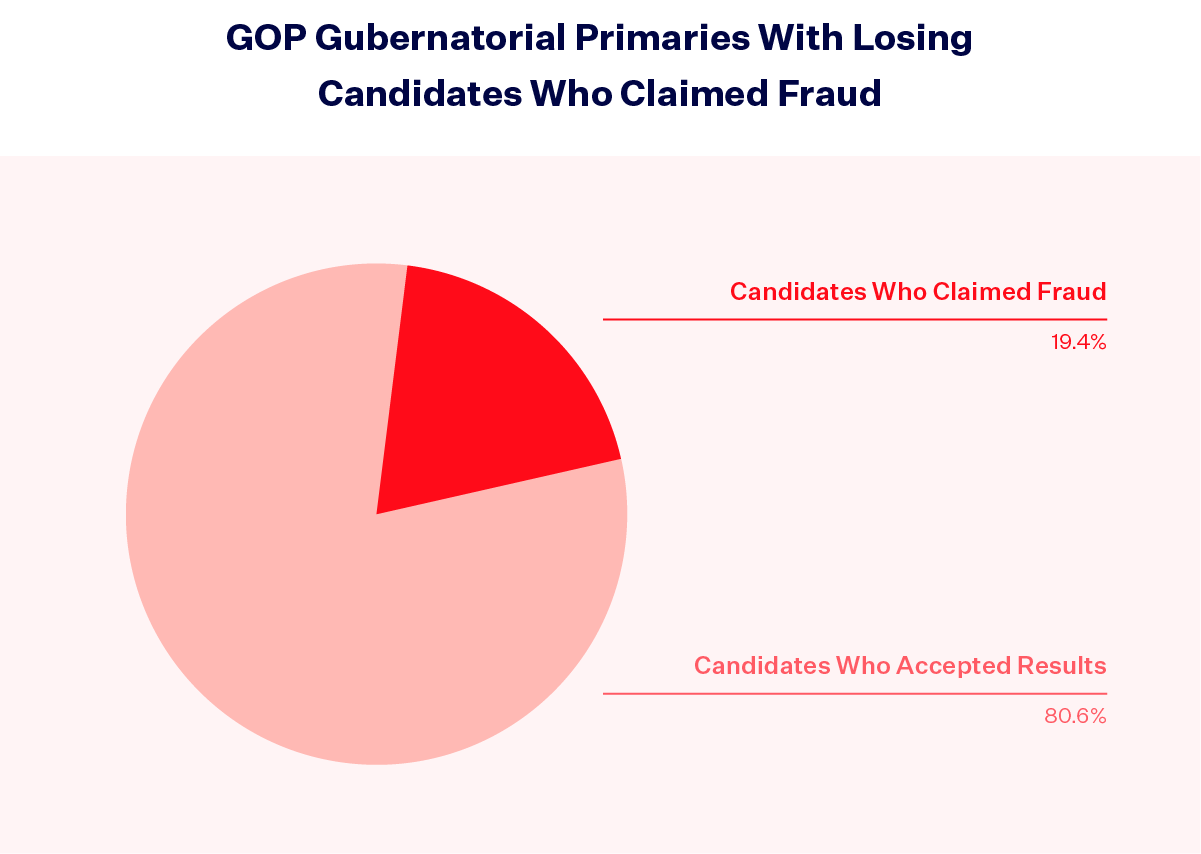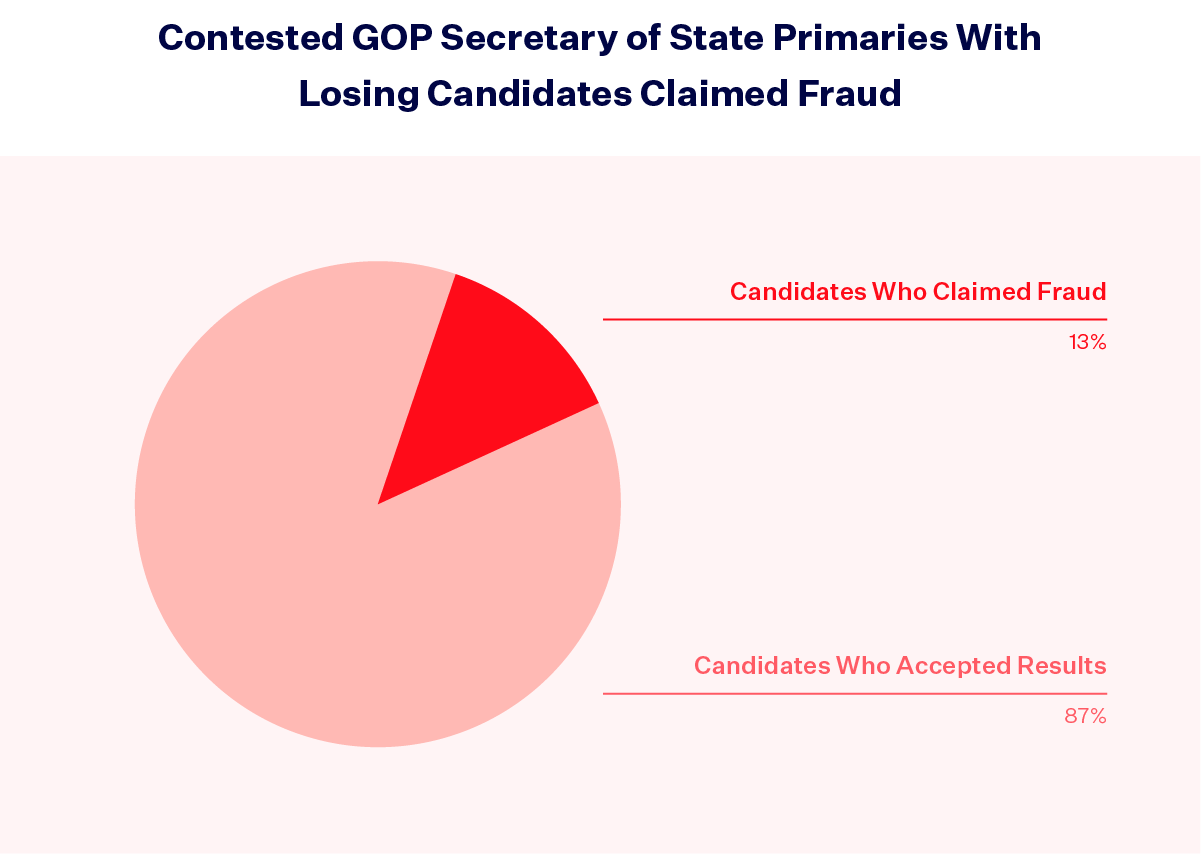The Republicans Who Cried Fraud After Losing Their Primaries

In September, Melissa Martz, a Republican who received 8.5% of the vote in the Republican primary for Florida’s 21st Congressional District, filed a lawsuit claiming fraud led to her loss. In Nevada, Joey Gilbert refused to concede, paid for a recount and filed a lawsuit after he lost the Republican primary for governor by more than 10 points. It’s been well-reported that many Republicans running for office deny or question the results of the 2020 presidential election — 60% of Americans will have an election denier on the ballot this fall. But Martz and Gilbert made us at Democracy Docket interested in a different question — how many Republicans running this year claimed that voter fraud led to their own losses?
To answer that question, Democracy Docket conducted a review of GOP primary elections for federal offices as well as statewide officials involved in election administration, including in the 36 gubernatorial and 27 secretary of state races on the ballot this November. We searched for concession statements and other remarks from candidates in the weeks following their elections and we identified several candidates who — though often losing by large margins — refused to concede or objected to the results on the basis of unsubstantiated claims of voter fraud. Dozens more raised concerns with the electoral process, though fell short of objecting to their loss. As it turns out, it’s not too hard to find Republican candidates who took a page from the Trump playbook when they lost this year.
Nearly 20% of all Republican gubernatorial primaries featured candidates who claimed they lost due to voter fraud.

Of the 36 states holding gubernatorial elections this year, 31 held contested primaries for the Republican nomination for governor. In six of those states, a candidate who lost the election — sometimes by wide margins — alleged that the voting was marred by fraud.
- In Alabama, Dean Odle — who received just 1.8% of the vote — posted on his campaign website that there are “serious problems with our voting machines and election security in Alabama” and that there is “no way [winning candidate Kay Ivey] won without a runoff and there’s no way I only received 11,720 votes.” Odle is now mounting a write-in campaign in the general election.
- In Georgia, Kandiss Taylor — who earned only 3.4% of the vote — claimed in a Twitter video that the election was rigged.
- In Michigan, Ryan Kelley — who came in fourth place — refused to concede and called for a hand recount of ballots.
- In Nevada, Joey Gilbert — who lost by more than 10 points — refused to concede and filed a lawsuit after a recount.
- In New Mexico, Sandoval County Commissioner Jay Block — who earned 9.7% of the vote — voted against certifying the primary results in his county (and another county in New Mexico refused to certify results until the state Supreme Court forced it to).
- In South Carolina, Bob Musselwhite — who received 15.9% of the vote — objected to the certification of the primary election results, alleging that “many very serious problems occurred in the election cycle.”
In contested secretary of state GOP primaries, over 10% had a losing candidate who cried fraud.

Allegations of fraud aren’t just limited to gubernatorial GOP primaries — three of the 23 contested secretary of state primaries had Republicans who claimed fraud impacted the outcome. Secretary of states often administer elections in their states — had any of these candidates won, they would have had the power to indulge election conspiracy theories in their official duties.
- In California, Rachel Hamm — after winning 9.4% of the vote — tweeted “there will be no concession. Stolen elections = stolen Republic.”
- In Colorado, Tina Peters — who came in third place — requested a recount after accusing the election of being rigged. Don’t forget, Peters herself is also currently under indictment for 10 charges of election tampering and misconduct.
- In Nebraska, Robert Borer — who lost by more than 13 points — claimed the incumbent “was allowed to choose, unilaterally, who counted the votes for his race and where they were counted.”
Democracy Docket found nine gubernatorial candidates and three secretary of state candidates who claimed fraud after losing their Republican primaries, but that number could have been higher had people like Kari Lake — who alleged there would be fraud in her election — and Doug Mastriano — who continues to spread election misinformation — not won their primaries. Coupled with the large number of actual gubernatorial and secretary of state nominees who fully reject or question the results of the 2020 election — 17 states will have a election denier on the ballot for governor and 10 will have one on the ballot for secretary of state — the GOP has clearly become a welcoming space for voter fraud conspiracy theorists.
While Republicans claiming fraud in Georgia and Michigan are merely echoing Trump’s allegations after he lost the states in 2020, our findings show that his seeds of doubt have also taken root in the red states he handily won. In states like Alabama, Nebraska and South Carolina, the GOP has complete control of election administration, but that didn’t seem to deter Republican candidates from crying fraud in the face of their primary losses. These days, Republicans will allege fraud in any state. For many Republicans — not just Trump — the only fair election is one that they win.